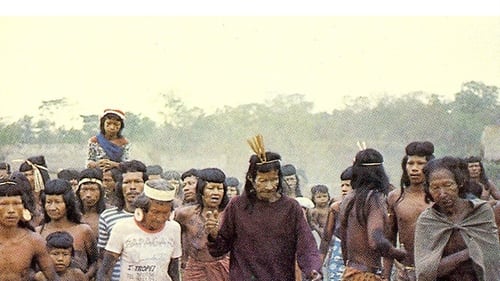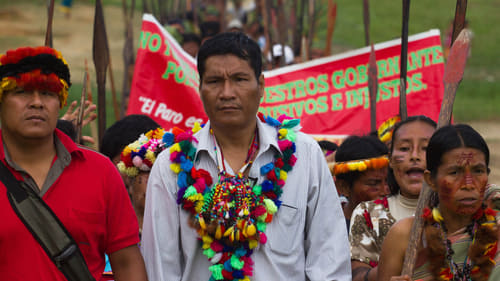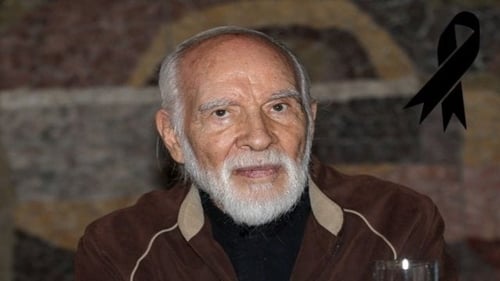Two Worlds Colliding (2004)
ジャンル : ドキュメンタリー
上映時間 : 49分
演出 : Tasha Hubbard
シノプシス
This documentary chronicles the story of Darrell Night, an Indigenous man who was dumped by two police officers in a barren field on the outskirts of Saskatoon in January 2000, during -20° C temperatures. He survived, but he was stunned to hear that the frozen body of another Indigenous man was discovered in the same area.

An anthropologist goes to the mountains to study the problems of the indigenous people and finds out that they are being dispossessed of their lands.

Carapiru is a member of one of Brazil's remaining indigenous peoples, living in harmony with nature and making wise use of the local flora and fauna. But Carapiru is suddenly forced to fend for himself and flees into the nearby rain forest, building a new life for himself with the help some sympathetic settlers. However, after rebuilding his life Carapiru is uprooted once again, this time by government agents. A expressive visual storytelling in this study of the native peoples of Brazil in the 21st century.

Two technicians foreign oil, along with the daughter of one of them, coming into the country to verify that there is a large oil field in the jungle area. They go in the area and must struggle against nature, isolation, loneliness and violence. The result, they will become victims in a new era of destruction and ambition.

This documentary is comprised of three shorts: 'El Afinque de Marín' that follows the musicians of the group Madera. 'Yo hablo a Caracas' about an indigenous leader and his reply to the authorities of the venezuelan goverment regarding the violations towards his people and finally 'Mayami Nuestro' chronicles the relationship of venezuelans during the eighties with the city of Miami.

For ancient Mayans, cocoa was as good as gold. For subsistence farmer Eladio Pop, his cocoa crops are the only riches he has to support his wife and 15 children. As he wields his machete with ease, slicing a path to his cocoa trees, the small jungle plot he cultivates in southern Belize remains pristine and wild. His dreams for his children to inherit the land and the traditions of their Mayan ancestors present a familiar challenge. The kids feel their father's philosophies don't fit into a global economy, so they're charting their own course. Rohan Fernando's direction tenderly displays a generational shift, causalities of progress in modern times and a man valiantly protecting an endangered culture. Breathtaking vistas of lush rainforests contrast with the urban dystopia that pulled Pops children away from him. Will one child return to carry on a waning way of life

Seventeen talented Australian directors from diverse artistic disciplines each create a chapter of the hauntingly beautiful novel by multi award-winning author Tim Winton. The linking and overlapping stories explore the extraordinary turning points in ordinary people’s lives in a stunning portrait of a small coastal community. As characters face second thoughts and regret, relationships irretrievably alter, resolves are made or broken, and lives change direction forever.

Navajo Film Themselves is a series of seven short documentaries: Intrepid Shadows (1966), The Navajo Silversmith (1966), A Navajo Weaver (1966), Old Antelope Lake (1966), Second Weaver (1966), The Shallow Well Project (1966), and The Spirit of the Navajos (1966).

Mayan Renaissance is a feature length film which documents the glory of the ancient Maya civilization, the Spanish conquest in 1519, 500 years of oppression, and the courageous fight of the Maya to reclaim their voice and determine their own future, in Guatemala and throughout Central America. The film stars 1992 Nobel Peace Laureate and Maya Leader Rigoberta Mencu Tum. All of the images, voices, expert commentary and music in the film come directly from Central America, the heart of the Mayan World.

A documentary on the war between the Guatemalan military and the Mayan population, with first hand accounts by Nobel Peace Prize winner Rigoberta Menchú.

A documentary on the massacre of Planas in the Colombian east plains in 1970. An Indigenous community formed a cooperative to defend their rights from settlers and colonists, but the government organized a military operation to protect the latter and foreign companies.

The Algonquin once lived in harmony with the vast territory they occupied. This balance was upset when the Europeans arrived in the 16th century. Gradually, their Aboriginal traditions were undermined and their natural resources plundered. Today, barely 9,000 Algonquin are left. They live in about 10 communities, often enduring abject poverty and human rights abuses. These Aboriginal people are suffering the threat to their very existence in silence. Richard Desjardins and Robert Monderie have decided to sound the alarm before it's too late.

A story of destinies joined by Guatemala's past, and how a documentary film intertwined with a nation's turbulent history emerges as an active player in the present.

In this tense and immersive tour de force, audiences are taken directly into the line of fire between powerful, opposing Peruvian leaders who will stop at nothing to keep their respective goals intact. On the one side is President Alan Garcia, who, eager to enter the world stage, begins aggressively extracting oil, minerals, and gas from untouched indigenous Amazonian land. He is quickly met with fierce opposition from indigenous leader Alberto Pizango, whose impassioned speeches against Garcia’s destructive actions prove a powerful rallying cry to throngs of his supporters. When Garcia continues to ignore their pleas, a tense war of words erupts into deadly violence.


A detective, goes from Spain to the Venezuelan Guajira, hired by the king of Wuayuus, to protect her, Niña de Maracaibo (wife of King, who belongs to an aristocratic family in the city) the detective tries to discover a conspiracy greater than initially imagined. Where he is only one piece in a plot which mixes smuggling, power struggles and tribal magic. The clash of two opposite visions, the 'Western' Spanish researcher, and the 'native' the Wuayuu original owners of Caribbean, converts this format film apparently 'police' in a thesis film revealing the mystery of the still existing singular South American identity.

Incident at Restigouche is a 1984 documentary film by Alanis Obomsawin, chronicling a series of two raids on the Listuguj Mi'gmaq First Nation (Restigouche) by the Sûreté du Québec in 1981, as part of the efforts of the Quebec government to impose new restrictions on Native salmon fishermen. Incident at Restigouche delves into the history behind the Quebec Provincial Police (QPP) raids on the Restigouche Reserve on June 11 and 20, 1981. The Quebec government had decided to restrict fishing, resulting in anger among the Micmac Indians as salmon was traditionally an important source of food and income. Using a combination of documents, news clips, photographs and interviews, this powerful film provides an in-depth investigation into the history-making raids that put justice on trial.

ETERNAL ASHES tells the story of a mother, Ana and her daughter, Elena. Although they are separated, in the space and time they remain united forever. The people and the millenarian culture of Yanomami are the framework of this story about the unbreakable bonds of filiations. After an accident in the furious flow of the mythical Orinoco River, in the fifties, Ana was considered dead. Elena as an adult and facing the negligible possibility that her mother is alive decides to leave to the Amazon to search her. ETERNAL ASHES is a story of filiations, poetry, wisdom and especially of humanity.

Towards the end of the 16th century, the Spanish conquerors living in the New World faced a serious problem: the evangelization of the indigenous people, who did not understand or accept Christianity due to their unshakable faith in their own religion. The court of the Inquisition cracks down on heretics and the natives prepare for a general uprising ...

The story of a town at the mercy of a landscape in transformation; standing on the brink of an encroaching reality, one in which the age-old fears of the inhabitants are being reproduced. A hamlet has survived, perched in a remote location where its children can grow up and the elderly can die and stay there.







